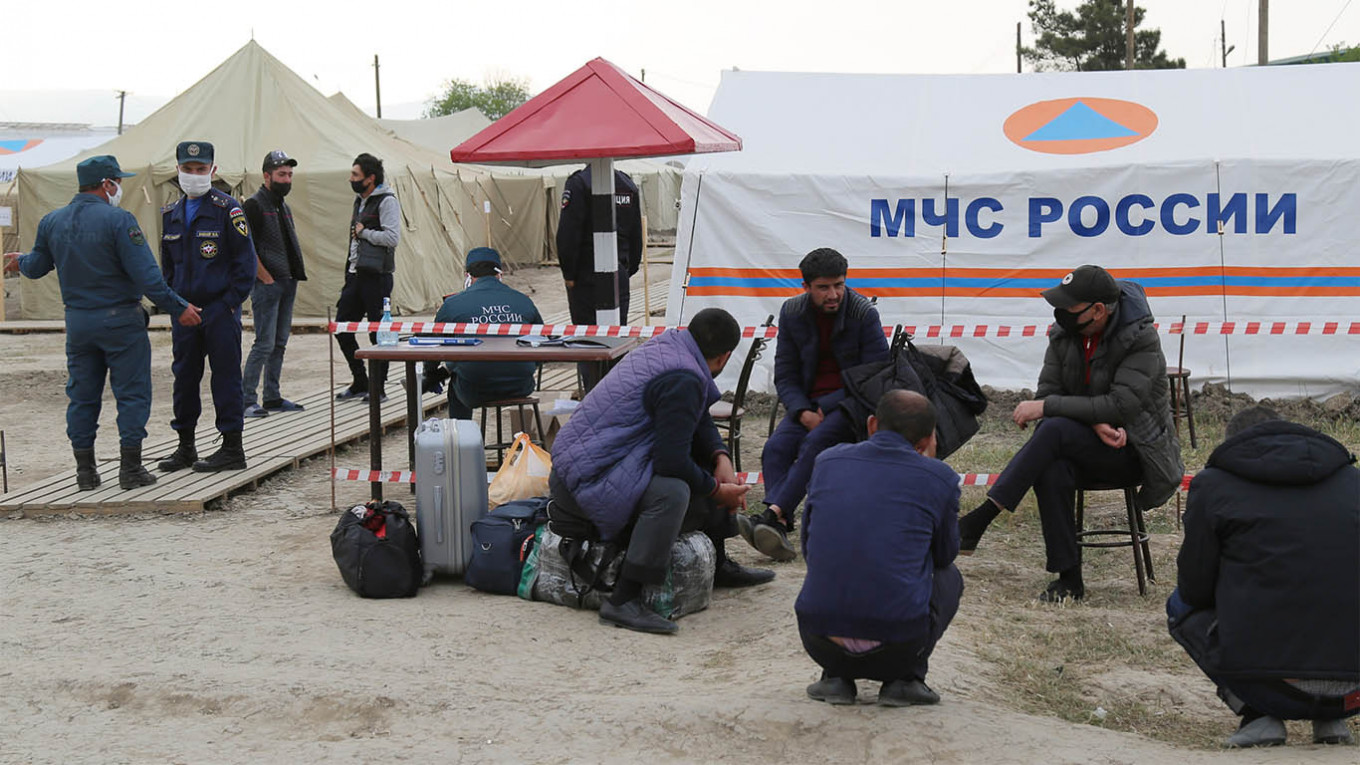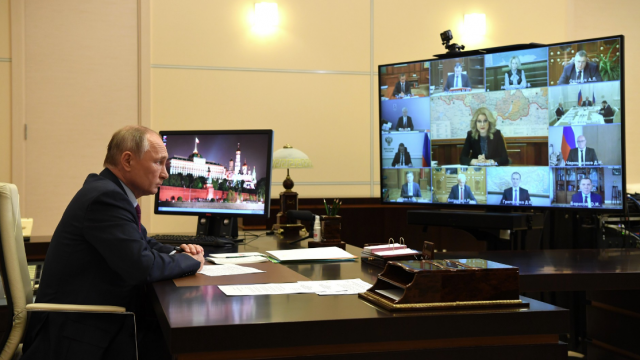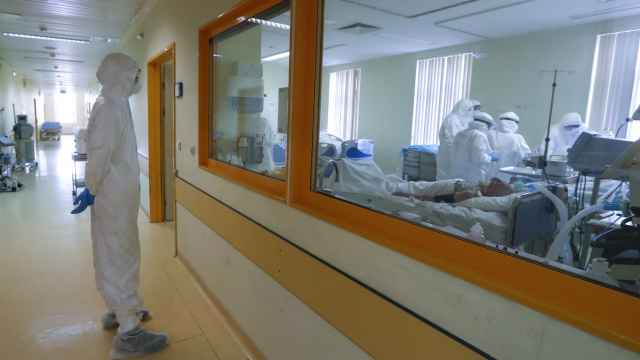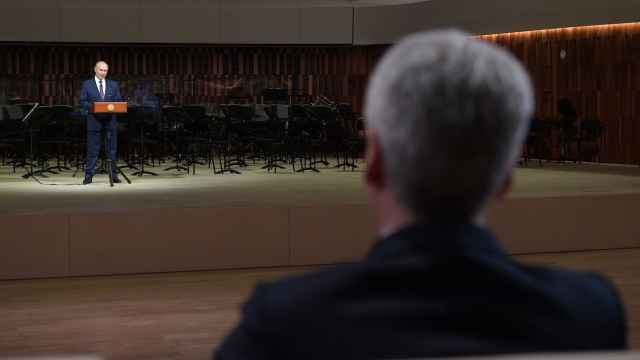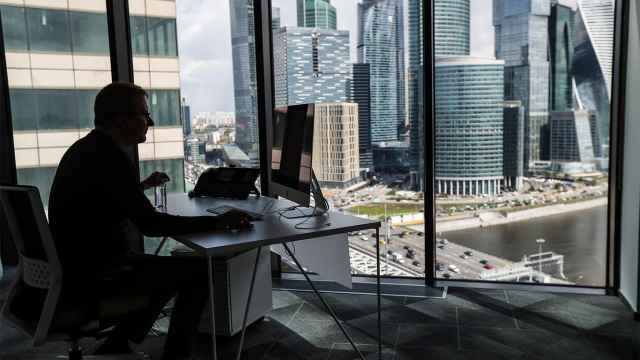Before 136 employees of the distribution center for the popular Krasnoe & Beloe discount liquor chain in central Russia’s Sverdlovsk region tested positive for the coronavirus on Monday, the region was set to relax its quarantine restrictions.
The region had taken its cue from President Vladimir Putin, who last week announced a plan for Russia to get back to work while leaving its implementation to regional officials. Like most regions, Sverdlovsk quickly moved to take up the call, despite Russia registering the world’s second-highest number of positive coronavirus cases as of Thursday with over 317,000.
But on his Instagram page Monday, Sverdlovsk governor Yevgeny Kuvyashev said the outbreak at the distribution center had forced him to delay relaxing pandemic restrictions — even if only for a week, until May 25.
As the coronavirus forces Russia to face a bleak economic future, the Sverdlovsk outbreak and its governor’s response underscore the challenge facing regional officials. Open up too soon and allow a second coronavirus wave to come crashing in; wait too long and see the economy crumble.
“Governors are making their decisions based on two factors,” said Natalia Zubarevich, an expert on Russia’s regions. “The first is making sure that the economy doesn’t die. The second is making sure masses of people don’t.”
“They are between a rock and a hard place,” she added.
Russia’s regions are set to face severe financial difficulties. In April, budgets took an average hit of 30%, Zubarevich said, estimating that regional tax revenue this year will fall by 10% compared to 2019. Meanwhile, S&P Global Ratings has forecast that Russia’s response to the pandemic will catapult its regions’ budget deficits to 20-year highs.
The need to ensure that Russia’s economy — which contracted by more than a quarter last month — gets up and running again was only reinforced Wednesday by Deputy Prime Minister Tatiana Golikova, who announced that unemployment has risen by 30% since the beginning of the pandemic.
At the same time, though, as Russia’s coronavirus peak crests — with more people recovering than becoming infected since May 18, according to the Meduza news website — questions have been raised over the true severity of the country’s outbreak and whether the data and methods guiding decision making for re-opening are accurate and effective.
Guidelines issued by Russia’s health watchdog Rospotrebnadzor say decisions to re-open should be made according to the effective transmission rate of the virus. Known as Rt, this variable differs from R0, a rate used by some other countries that looks at how many people a single carrier of the coronavirus is infecting.
To calculate Rt, Rospotrebnadzor prescribes dividing the number of positive coronavirus cases recorded in a region over the past four days by the number of cases recorded in the four days prior. If the result is less than 1, then the region can open. Using that methodology, 33 of Russia’s 85 regions could have opened as of May 18, according to the independent Novaya Gazeta newspaper.
Yet Vasiliy Vlassov, an epidemiologist at the Higher School of Economics, believes the algorithm “gives an illusion of accuracy.”
“A huge number of cases go untested, the quality of the testing itself is unclear and we still keep getting reports of people not getting their test results back,” he said.
Russia has struggled with testing accurately since the start of the pandemic.
Moscow Mayor Sergei Sobyanin, who heads Russia’s coronavirus taskforce, recently said that half of the capital city’s critical coronavirus patients had tested negative for the virus — twice.
Meanwhile, the North Caucasus region of Dagestan, which pleaded to Putin for help to avoid a catastrophe this week, has registered just 41 deaths from Covid-19 against nearly 700 from viral pneumonia since the beginning of the pandemic.
Ibragim Yevtemirov, a doctor treating suspected coronavirus patients in the Dagestan city of Khasavyurt, told The Moscow Times that his hospital was at one point losing up to 13 patients per day.
“We sent tests to Rospotrebnadzor but the results would never come back,” he said, “so the deaths were never registered as being from Covid-19.”
In addition to the patients, Yevtemirov has also lost seven colleagues as well as four people from his close circle in his nearby home village of Khamavyurt.
“None of them, as far as I know, received a positive test result,” he said.
There is also the issue of potentially manipulated numbers.
Boris Ovchinnikov, director of the Moscow-based Data Insight research agency, has been tracking Russia’s coronavirus figures since the beginning of the pandemic. As it has developed, he has seen enough signs to believe that regional officials are cooking the books.
Over 12 days in the Krasnodar region, from May 4 to May 15, positive cases increased by between 96 and 99 cases per day, Ovchinnikov said. Over the same length of time in the Kursk region, between April 26 and May 7, cases rose by between 65 and 69 per day. In the Lipetsk region, over 11 days from May 5 to May 15, the number of cases grew by between 46 and 49 per day.
“For Krasnodar, for instance, the likelihood of that occurring is 1 in 3 billion,” Ovchinnikov said. “It’s as if there is a set figure they’ve decided not to reach and they massage the numbers just a bit to make it look like there are real fluctuations.”
“If this falsification of data is going unpunished, it becomes hard to trust all of the numbers,” he added.
In addition to requiring an Rt lower than 1, Rospotrebnadzor also dictates that more than half of the region’s ICU beds should be available for new patients and that no less than 70 coronavirus tests be carried out per 24 hours. On Monday, Prime Minister Mikhail Mishustin, who himself recently checked out of the hospital after coming down with the coronavirus, announced that 27 regions met all those criteria.
As of Monday, though, 60 regions had already started relaxing restrictions, according to a count by Novaya Gazeta.
But like Sverdlovsk, not all stuck with the plan. On Tuesday, the Saratov region reintroduced restrictions after a spike in new cases.
Vlassov, the epidemiologist, believes this kind of “flexibility” would serve all Russian regions well going forward.
“In principle we should rely on common sense,” he said. “If there are no new cases, then it’s safe to ease up restrictions.”
The situation in Sverdlovsk, though, highlights the difficult position regional officials have been put in as a result of politics.
Last week, even before the outbreak at the Krasnoe & Beloe distribution center, the region’s chief health officer Dmitry Kozlovskikh had not only urged the governor to keep restrictions in place but to ramp them up. On Wednesday, he said that restrictions should only be lifted 20 days after positive cases begin falling.
Fyodor Krashennikov, a political analyst based in Yekaterinburg, Sverdlovk’s capital city, said the dissonance was fostered at the top of Russia’s political system. He noted how, after the region’s governor announced restrictions would be lifted, Putin’s presidential envoy for the Urals Nikolai Tsukanov came out in support of Sverdlovsk’s chief health officer.
“The president himself created this situation,” Krashennikov said. “Officials realize they have to follow through with his directives. But while he called for the country to get back to work, Putin also was clear that there shouldn’t be another outbreak.”
“Now we are left with different officials using these two different lines of thinking to try to impress him,” he added.
A Message from The Moscow Times:
Dear readers,
We are facing unprecedented challenges. Russia's Prosecutor General's Office has designated The Moscow Times as an "undesirable" organization, criminalizing our work and putting our staff at risk of prosecution. This follows our earlier unjust labeling as a "foreign agent."
These actions are direct attempts to silence independent journalism in Russia. The authorities claim our work "discredits the decisions of the Russian leadership." We see things differently: we strive to provide accurate, unbiased reporting on Russia.
We, the journalists of The Moscow Times, refuse to be silenced. But to continue our work, we need your help.
Your support, no matter how small, makes a world of difference. If you can, please support us monthly starting from just $2. It's quick to set up, and every contribution makes a significant impact.
By supporting The Moscow Times, you're defending open, independent journalism in the face of repression. Thank you for standing with us.
Remind me later.



